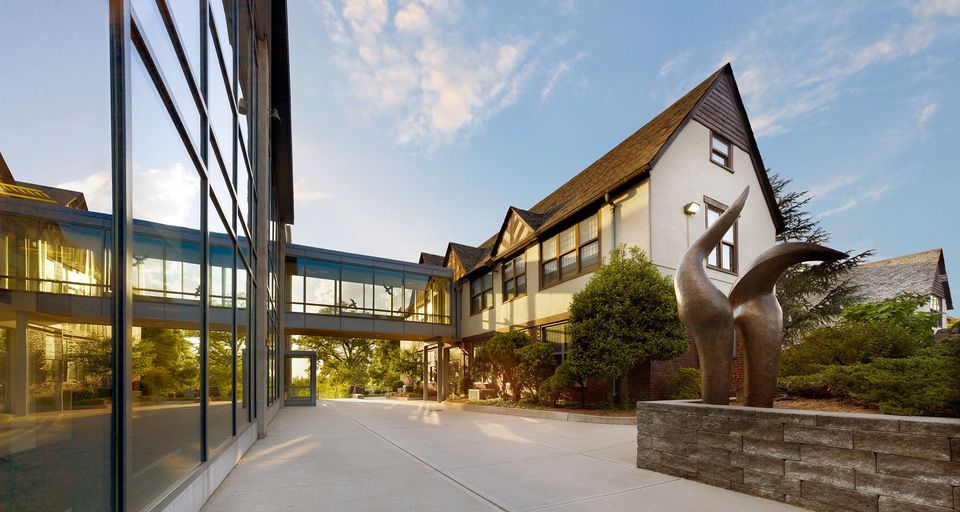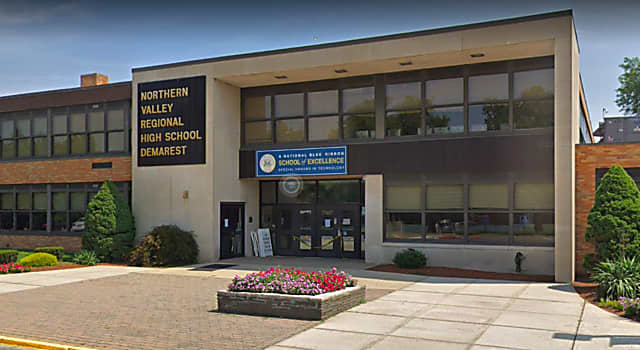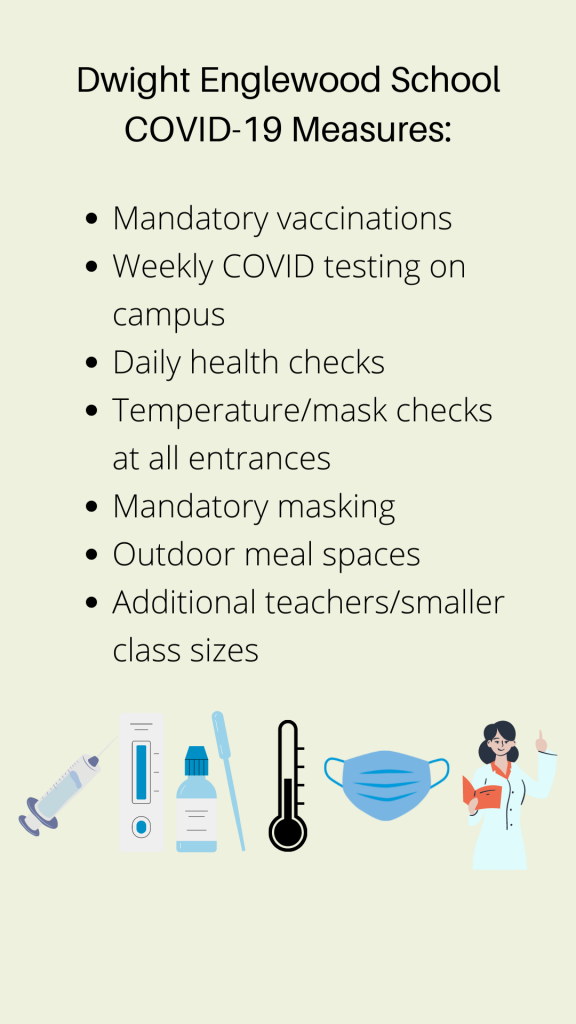A Private School Pandemic:
The impact of COVID-19 on childhood education in Bergen County, NJ.

“We’re pretty full even for next year…I think it’s a mix of just basically having awesome teachers who have been here every day since the pandemic started and being able to know that your child’s actually going to be in school and be educated. “
– Helen Jerome, Dwight Englewood School Senior Director of Admissions
Photo Credit: Dwight Englewood School Facebook Page

“I would say confidently, we were probably one of the highest— at least from our knowledge— one of the highest achieving schools throughout probably the state.”
– Michael Fox, Demarest School District Superintendent
Photo Credit: Google Maps
“It all came back to they were just trying their best with what limited resources they had. I mean, it was understandable that they were trying their best, but we were just looking for something a little more.”
–Alice Chu, Former Franklin Lakes Public School Parent/Current Dwight Englewood School Parent
During the peak of the pandemic, 55.1 million students nationwide were recommended or ordered to stay home. Bergen County, New Jersey was no exception. On March 18, 2020 New Jersey ordered that all schools close for the remainder of the school year due to the COVID-19 pandemic. Private school students and public school students alike were suddenly getting the same Zoom education. But were they really?
Before COVID-19, anyone could walk across the sprawling green grass up the hill to the top of the 45-acre property looking over the entire city of Englewood, New Jersey. Walk a few more streets past campus, and you’d see the bustling city of New York across the Hudson River. Welcome to Dwight Englewood School, a private co-education school in Bergen County, New Jersey.
COVID-19 forced many new requirements upon the Dwight Englewood School beyond the need to close its campus for many months. Throughout the pandemic, the school implemented many safety protocols. Vaccines became required for all faculty, staff, and students once available. Faculty, staff, and students were tested weekly for COVID-19 on campus and wore masks at all times indoors. Mealtimes were held outside and every building entrance featured a new system that checked temperatures and masks. Every person who stepped foot on campus was asked to fill out a health-check form in order to gain entry.
Beginning in the fall of 2020, students and teachers were given the option to move back to in person learning or remain online. Additional classroom teachers were added on each level in the lower and middle schools in order to decrease class sizes and promote social distancing. Students whose families selected the online learning option were in classes with other online students and teachers. All students and teachers returned to in person learning at the beginning of the 2022 school year.
Dwight Englewood’s student body is largely comprised of Bergen County and New York City residents. During the COVID-19 pandemic, Dwight Englewood admissions saw an increase in applicants and enrolled 188 new students between the lower, middle, and upper school in the 2020-2021 school year. 3 of these students came from Demarest public schools. 57 of these students came from New York. Dwight Englewood was not the only private school to experience this phenomenon. California experienced a statewide 3.9% increase in private school enrollment despite years of declining enrollment prior to the 2020-2021 school year, according to the California Association of Private School Organizations. In October of 2021, The CATO Institute’s Center for Educational Freedom surveyed 68 private schools throughout the country. Of the 68 schools, 35% reported an increase in enrollment and 38% reported no change.
Two towns over from Englewood is the 2 mile wide suburb of Demarest. The median household income reported in 2019 was $154,500, making it way above the state’s 2019 median household income of $85,245. Although the town may be small, Demarest is home to four schools. The school district comprises Country Road School (Pre-K, K-1), Luther Lee Emerson School (2-4), Demarest Middle School (5-8), and Northern Valley Regional High School at Demarest (8-12). Northern Valley Regional High School at Demarest (NVD) serves high school students from neighboring towns Closer and Haworth as well.
In order to cope with the pandemic, the Demarest School District required all faculty, staff, and students to wear masks. Masks, sanitizer, and temperature checkers were available in all four schools. Lastly, extra furniture was moved in trailers in order to allow for social distancing in classrooms. The district did not require vaccinations but reached an 81% vaccination rate, according to the superintendent of the Demarest School System, Michael Fox.
As for learning, the Demarest School District created a system that allowed students to attend classes in person for four hours a day on some days and attend classes on Zoom for four hours a day on other days. Outside of those four hours each day, students were expected to complete assignments on their own. Half-way through the 2020-2021 school year, the Demarest Schools began conducting half of the day in person and half of the day online in order to increase schooling hours. All of the schools went back to full in person learning at the beginning of the 2022 school year.
According to the New Jersey School Performance Report published by the state each year, there was a decline in County Road School, Demarest Middle School, and Northern Valley Regional High School at Demarest enrollment numbers between the 2019-2020 and 2020-2021 school years. Luther Lee Emerson School, on the other hand, experienced an increase in enrollment. The high school, which experienced a decrease in enrollment by 33 students the previous year, decreased in enrollment by 26 students. Despite some fluctuations, the other three schools’ enrollment numbers are similar to those of the 2018-2019 school year. It is unclear if the high school enrollment decline is a result of the pandemic. Statewide, there were 41,351 less students enrolled in New Jersey public schools in the 2020-2021 school year than in the 2019-2020 school year.


The pandemic was yet another reminder of the separation between those who have and those who do not. Looking through the lens of how Dwight Englewood, a private school that costs $52,100 a year, was equipped to tackle COVID compared to the neighboring Demarest Public School system, provides a possible explanation for an increase in private school admissions and raises questions about the future of education.
The Dwight Englewood Head of Lower School Admissions, Helen Jerome, credits the increase in admissions to a combination of factors. “We’re in a situation where a lot of people have left the city in the past two years and want to still be in an independent school but in this area,” Jerome said. “I think it’s a mixture of just basically having awesome teachers who have been here every day since the pandemic started and being able to know that your child is actually going to be able to be in school and be educated.”
Despite Dwight Englewood’s increase in applicants, Jerome is hesitant to call this a trend among private schools. “I feel like we’re a little unique in the fact that like all of our admissions numbers are pretty good… actually very excellent. Actually, we’re pretty full even for next year. I’m not sure that’s a national trend…” Jerome explained why she believes Dwight Englewood may be experiencing a rise in applicants. “It’s a mixture of kind of these amazing things going on at Dwight-Englewood and then kind of just being able to have tremendous outreach to families,” Jerome said.
If it is a trend, however, one of the possible explanations could be the liberties that independent schools were able to take during the pandemic due to their increased funds and lack of public oversight.
Lower School Teacher Michelle Sussmann speaks highly of Dwight Englewood’s handling of pandemic education, in part because if families chose to keep their kids home, they had a separate teacher than children in-person. “They staffed up and put an extra teacher at every grade level, so the kids at home got a much better experience than they would’ve been if they would’ve been hybrid and up on the screen… like an afterthought,” said Sussmann.
Besides the extra staffing, Dwight Englewood also implemented many expensive safety precautions. “They set up a testing center on campus, so weekly, everybody gets tested. Everybody has to wear masks. There are monitors that when you walk by check your temperature and if you have a mask on. And then every morning, every kid or parent of a kid has to fill out one of those surveys that you get on your phone through a text message or email…If you have certain things that you say yes to, you get dinged and you have to contact the nurse and you can’t come in until you’re Covid tested,” Sussmann said.
For Sussmann, however, her satisfaction with Dwight Englewood’s handling of the pandemic went beyond safety measures. “We’ve definitely been encouraged from the Principals and Head of School to focus on the social/emotional…make sure the kids are okay. I think that’s something that’s probably happening more at private school than public school for many reasons,” Sussmann said.
The superintendent of the Demarest School System Michael Fox said they too had to take safety precautions. “We moved all the furniture out of the classrooms, and we put them in trailers… Each student had to be six feet from the other, so we actually were able to maximize the square footage because furniture takes up so much. And we took everything out and we basically just went with chairs and desks, and we were able to house all the students back,” Fox said.
All these changes had to fit within the school district’s budget made up of government allotted funds. “We had budgeted money that we were able to use out of a capital outlay. … there was always a cost for everything we did. Just even the supplies of the sanitizers we used was exorbitant… Most of it came out of budgeted money, at the same time, through Astor Funds, federal money came,” Fox said. The Brooke Astor Fund is a fund of private donations that support nonprofit organizations such as public education.
An extra consideration for the Demarest School System is the importance of maintaining a united front with the other public schools in the county. “In Northern Valley [the greater Northern New Jersey school region], all of us are trying to work together and trying to come up and try to stay on the same page. However, that was an impossible task. So, one of the things Northern Valley has always tried to do is when we make decisions, we try to make decisions so we’re kind of bonded together,” Fox explained.
Dwight Englewood, on the other hand, views decision-making from a business perspective, according to Sussmann. “I think that they were very aware that it’s a business. I think the faculty was lucky in that we were given options and teachers at other schools were not. You were either in [with what the school decided] or you didn’t have a job. But when it came to asking how faculty feels about the school opening, we weren’t asked.”
For some families, however, their decision to consider alternative schooling options didn’t stem only from public schools’ handling of the pandemic but from their curriculum.
Alice and Peter Chu, a couple from Franklin Lakes, New Jersey, enrolled all three of their children at Dwight Englewood in 2021.
The Chu family decided to switch their children, Alexander, nine-years-old, Caroline, 13, and Lauren, 15, from public school to private school when they felt their concerns would not be heard. “I mean, a lot of parents had had conversations with the school officials just about, you know, can we extend the day, or can we extend the instruction? But it all came back to, well, they were just trying their best with what limited resources they had,” Chu said.
For Alice Chu, virtual schooling highlighted problems beyond the handling of the pandemic, however. “I guess that was my first glimpse into what they were learning in school, and how instruction was going during the day. We felt like maybe we wanted a school that might have more materials covered or even just the interest level in learning of all the different classmates and the environment they’re in,” Chu explained.
The Chu family, and many of their friends, had always been interested in looking into switching their children to an independent school. The pandemic expedited this decision for them. “We heard how Dwight was handling virtual schooling and how, um, they had cameras set up everywhere, and it felt like the kids were really still involved and engaged even when they were still learning from home,” Chu said.
Chu doesn’t see the interest in private school education ending any time soon. “I feel like once other people hear about our experiences and other people’s experiences after the move, it makes them more open to looking into private schools, as well, because I know a lot of people just didn’t want to deal with the change, but I think that after COVID it just sort of opened up everyone’s eyes in terms of maybe there’s something else we were going to be open to, just to sort of help our kids’ education if we can,” Chu said.
The relationship between the pandemic and private schools highlights the role that money plays in American education systems. Private schools were more financially equipped to handle COVID-19, and well-off families were able to afford to give their children different educational opportunities. If private school admissions continue to rise, the gap between those who have and those who do not will only grow larger. What effect will this have on the future of childhood education in America? Only time will tell.